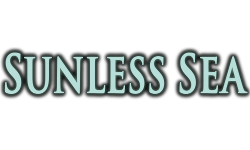|
|

|
PLATFORM
|
PC
|
BATTLE SYSTEM
|

|
INTERACTION
|

|
ORIGINALITY
|

|
STORY
|

|
MUSIC & SOUND
|

|
VISUALS
|

|
CHALLENGE
|
Moderate
|
COMPLETION TIME
|
20-40 Hours
|
|
OVERALL

|
+ Rich, rewarding writing
+ Dark mood chased with humor and whimsy
- Slow, deliberate pacing
- Limited economic options
|
Click here for scoring definitions
|
|
|
Failbetter Games' first foray outside of browser-based stories is ambitious. Although sculpted from the same narrative clay as its flagship, Fallen London, Sunless Sea takes on the additional tasks of real-time naval combat, ship management, and exploration. The atmosphere and writing are top-notch. Other, more gamey elements such as pacing and economic balance aren't as finely honed. Among the market-driven Hallmark Futurists of the Steam wishlist world, Sunless Sea is a louche Romantic: charming and possessing of meteoric wit and staggering humanity, but unsteady on her feet and slightly crazed.
The game starts in Victorian London, far beneath the earth's surface. Years ago, the city was stolen by bats. To the east rests the broad Underzee, which is home to monsters, islands, and above all, opportunities for glory and death. As the new captain of a rusted tramp steamer, glory calls. Glory — as well as the end of the game — are attained in several ways: laying a dead family member to rest, writing the definitive epic of the Underzee, or amassing wealth beyond belief. In pursuit of these goals, other end conditions reveal themselves.
Most of Sunless Sea is spent on the open waves. Apart from a few set locations, islands shift location between games to keep exploration fresh. When opponents approach, whether they be giant crabs or luminous sun-ships, combat begins. The longer an opponent remains within a cannon's firing arc, the easier it is to hit. Sometimes it's worth making a frenzied, poorly aimed shot; other times, only a slow-but-steady guaranteed hit will be worth the trouble. Maintaining a favorable ship position and managing cooldowns are the key to victory. Sifting through a foe's self-chummed grave provides treasure and valuable supplies.
 Feast an eye on that motley crew.
Feast an eye on that motley crew.
|
|
In spite of their contusions and snarl, pirates and beasties aren't the true gems of the Underzee; that honor goes to its distant ports. Spending time at sea triggers the "something awaits you in port" flag, which unlocks unique stories at each port. Perhaps a secretive order of postal workers could use a new assistant or an isolationist city-state is entertaining visitors. Navigating the story menus provides opportunities for trade, exploration, political intrigue, and madness. Ports are also places to resupply, hire crew, unload trade goods, and purchase upgrades.
It's difficult to overstate the appeal of Sunless Sea's atmosphere. Light is the great savior, but it also brings death. Existence is only assured in the shadows, skirting the margins and ducking from temporary safety to temporary safety. Even lighting the ship's lanterns enters into the system of choices that govern survival. Keeping the ship lit appeases the superstitious crew and limits the accumulation of terror; it also burns precious fuel and paints a glowing target on the ship's back and kidneys. The dark, harrowing score supports this eerie mood, fading in when necessary before slipping beneath the waves. In addition to darkness, smoke, fog, and bats mask the horizon. There's always something out there hiding, but that doesn't take away from what is visible. The ports communicate their personalities through architecture and static graphics, providing just enough imagery for the imagination to grab on and start filling in the blanks.
"Here be monsters," cry the blank spaces of the map. "Turns out it's man." The open world is jagged with plot hooks to snag desperate captains. In turns (and simultaneously), stories are fearsome, darkly comic, and earnestly whimsical. One port is gripped in a conflict between intelligent rats and aristocratic guinea pigs; nevertheless, men die and terror increases.
Traveling to new ports captures the wonder of visiting a foreign land, but also the alienation. Settling down is rarely an option: more erstwhile allies require smugglers and pawns than would-be governors or saviors. The outposts of humanity in the Underzee invite travelers to understand them, but warn that looking too deep isn't always wise. This is a game of grim choices — "Eat your crew" is half of the game's tagline. There are plenty of choices that feel as if they were designed to unnerve. Rarely does the game directly punish murder, torture, or foul mischief. Guilt is a more personal matter that is left to the player.
 When you gaze long into the abyss, the abyss gets hungry.
When you gaze long into the abyss, the abyss gets hungry.
|
|
The terrible freedom of choice shows its fangs in many ways, many of which end in death. Default permadeath ratchets up the tension, but may be too harsh for the early learning curve. Perennial record-keepers and roguelike fans may appreciate the stakes, others less so. The legacy system helps entice those wary of death to give it a shot. Upon dying, one of the captain's relations (e.g. rival, pupil, scavenger) selects some of the deceased's statistics and belongings to keep. Recovering special treasures further enhances the strength of a captain's legacy. If even these lures fail to entice, permadeath can be turned off. Who would even know? If they did know, would they even care? Sunless Sea has earned ire for some of its design decisions. What's a little reloading between friends, even if it interferes with the thematic motifs?
Although Sunless Sea's devotion to its aesthetics are admirable, a handful of additional concessions to the gameplay would have drawn something incredible from the merely excellent. Despite claims made in the post-mortem report, slightly faster ships wouldn't ruin the experience. There are times when the deliberate pacing leads into a fugue state of tense meditation, but they never last. I often found myself minimizing the game and walking away from the computer after plotting a relatively safe course through eel-infested waters. While this technique took time to perfect, the boring travel time it prevented was worthwhile.
Alexis Kennedy, Sunless Sea's primary architect, has explained Sunless Sea is a story-based game, not a trading game. Nevertheless, accumulation of wealth is important. Early voyages require strict attention to the fuel and supply stores; death and madness are common. Profitable trade routes exist, but exploration and taking part in stories provide the best rewards. Unfortunately, the stories can run dry before completing a captain's ambition. At this point, grinding is inevitable. Critiquing a story-driven game for its limited crunchy maritime trade elements feels a little unfair; however, there are enough mechanical interactions with trade, cargo, and wealth management that a more robust economic sub-system would have added further depth and replayability to the world.
Sunless Sea is a unique experience that few fans of careful planning and literary cannibalism should ignore. Proponents of Fallen London's dark sensibilities and chilling, lore-rich writing will more than forgive its few mechanical trespasses; however, even less patient gamers may want to peek in to experience the sights and sounds of the zee. A three-hour tour of interest may transform into pages of scrawled notes and weeks of pleasurable-yet-sleepness nights.
Review Archives
|









